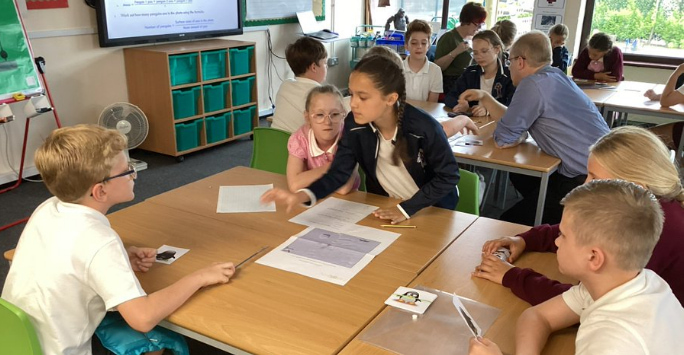
Researchers from the Department of Health Data Science recently visited Roby Park Primary School as part of the school's Careers Week. As Statistics Ambassadors, their role is to make maths exciting. In this case, they brought their most popular activity - penguin poo!
It’s a warm Wednesday morning in July. Would you rather be sat at your desk replying to emails, or stood in front of a class of 10-year olds talking about maths?! For many, the former is infinitely more enjoyable than the latter. However, for the Statistics Ambassadors within Health Data Science that is not the case!
Dr Laura Bonnett and Dr David Hughes, two members of the Stats Ambassador team, had been asked to visit Roby Park Primary School as part of their Careers Week. The school had also invited medics, emergency services personnel, translators and mindfulness experts to visit all the classes over the course of five days with the aim of introducing their young learners about jobs they might have in the future.
Selling maths as a career is always going to be a tough sell – from an early age people express their dislike of the subject, and this doesn’t really change for many. However, the Stats Ambassador team have created a set of activities that aim to dispel the myth that “maths is boring” or “maths is too hard”. Using props and with real-life topics, the team visit schools and science Festivals around the North West encouraging the next generation to think positively about numbers.
Considering the audience (9-11-year olds) and the time (9am on a Wednesday morning within the last few weeks of the academic year), the team choose to take their most popular hands-on statistics activity to Roby Park Primary – penguin poo! Full details of the activity, and the other activities in the set, can be found at www.rss.org.uk/hands-on. In brief, the “how many penguins” activity introduces people to the concepts of populations and samples. Using information obtained from a sample of ‘local’ (soft toy or paper) penguins, the activity helps students to infer how many penguins live in a colony in Antarctica. Whilst the penguins usually invoke a few coos, the real hook of the activity is the use of penguin poo as the information obtained from local penguins!
Year 5 were the first to estimate surface area of penguin poo seen on snow in a satellite photograph of Antarctica. They then estimated the mean amount of poo produced by a sample of three paper penguins (“borrowed” from Chester Zoo for the purpose of making it real) and used these two values to calculate how many penguins had produced the poo in the photograph. The class noticed that the numbers calculated by each group were slightly different which led onto a discussion about variability, and plotting of the results to consider the most likely population number.
To ensure the link to Careers Week, the students then quizzed the Ambassadors about their job, their training and their most challenging situation to date. One student couldn’t quite believe that the Ambassadors had been statisticians for more years than his age! Similar questions arose from Year 6 who were next on the timetable. However, one of those students asked about the possibility of penguins living on space – definitely outside the knowledge of a statistician!
This is just one visit of many this academic year and there are plenty more planned for next academic year. The Health Data Science Statistics Ambassadors are happy to provide a tailored solution for any schools or youth clubs. We have run numeracy skills for Beaver Scouts right through to University taster sessions for 17 year olds. Do contact Dr Laura Bonnett (L.J.Bonnett@liverpool.ac.uk), Outreach Lead for the Department, to discuss how we can help.